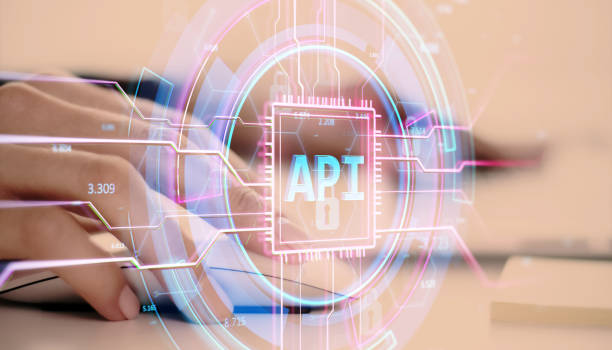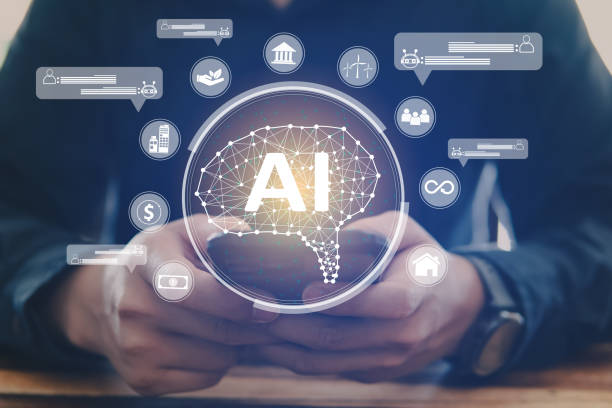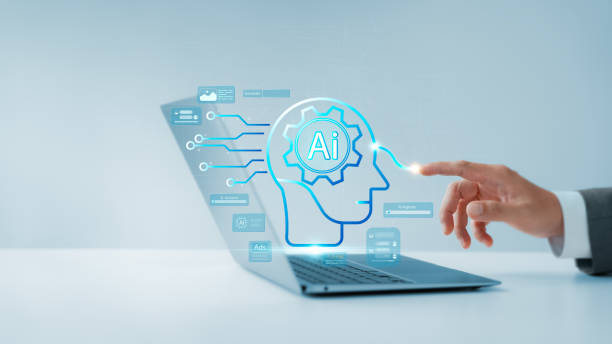What is Artificial Intelligence? Definitions, History, and Basic Concepts

Artificial Intelligence (Artificial Intelligence) (AI), in short, refers to the ability of a machine or computer system to mimic human cognitive functions such as learning, reasoning, problem-solving, and decision-making.
This field of computer science seeks to build machines that can perform tasks that currently require human intelligence.
#Artificial_Intelligence is a broad and multidisciplinary field that includes various sub-branches such as machine learning, natural language processing, computer vision, and robotics.
The history of artificial intelligence dates back to the 1950s when researchers began to explore the possibility of building machines with human-like intelligence.
Since then, the field has made significant advancements and is now used in many areas including medicine, finance, transportation, and entertainment.
Artificial intelligence, using complex algorithms and big data, tries to identify patterns, predict outcomes, and make intelligent decisions.
The ultimate goal of artificial intelligence is to create systems that can independently solve complex problems without human intervention and help improve human life.
Are you tired of your company’s website not being seen as it should be and losing potential customers? Solve this problem forever with professional and effective website design by Rasaweb!
✅ Increase brand credibility and build customer trust
✅ Attract targeted sales leads
⚡ Contact us now for a free consultation!
Types of Artificial Intelligence: An Overview of Different Approaches

Artificial intelligence can be categorized based on various criteria.
One of the most common methods is to classify based on the abilities and performance of intelligent systems.
Based on this, artificial intelligence can be divided into two general categories: weak artificial intelligence (Narrow AI) and strong artificial intelligence (General AI).
Weak artificial intelligence, also known as limited artificial intelligence, is designed to perform a specific task and specializes in that field.
Examples of weak artificial intelligence include facial recognition systems, spam filters, and virtual assistants like Siri and Alexa.
These systems are very efficient at performing the assigned task, but cannot operate outside of that task.
In contrast, strong artificial intelligence, also known as general artificial intelligence, has cognitive abilities similar to humans and can perform any task that a human can perform.
Strong artificial intelligence is still in the development stages, and achieving it is one of the main goals of artificial intelligence researchers.
In addition, artificial intelligence can also be categorized based on learning methods, such as supervised learning, unsupervised learning, and reinforcement learning.
Each of these methods has its own advantages and disadvantages and is suitable for solving different problems.
Understanding the different types of artificial intelligence helps us to better understand its potential applications and make the best use of it in various fields.
Machine Learning: The Beating Heart of Artificial Intelligence

Machine Learning (ML) is one of the main sub-branches of artificial intelligence that allows machines to learn from data without explicit programming.
In other words, instead of giving machines step-by-step instructions, machine learning algorithms are given to them, and machines discover patterns and relationships by analyzing this data and gain the ability to predict and make decisions.
Machine learning is divided into three main categories: Supervised Learning, Unsupervised Learning, and Reinforcement Learning.
In supervised learning, the machine is trained using labeled data, meaning that each input data is associated with an expected output.
In unsupervised learning, the machine is trained with unlabeled data and must discover patterns and structures independently.
In reinforcement learning, the machine learns how to optimize its behavior by interacting with an environment and receiving rewards or penalties.
Machine learning is used in many fields, including image and voice recognition, predicting customer behavior, fraud detection, and developing self-driving cars.
Artificial Intelligence has witnessed significant developments in recent years thanks to advances in machine learning and is expected to play an even more important role in our lives in the future.
| Type of Machine Learning | Description | Example |
|---|---|---|
| Supervised Learning | Training using labeled data | Spam email detection |
| Unsupervised Learning | Discovering patterns in unlabeled data | Customer segmentation |
| Reinforcement Learning | Learning through reward and punishment | Playing games |
Natural Language Processing: A Bridge Between Humans and Machines

Natural Language Processing (NLP) is another important sub-branch of artificial intelligence that allows machines to understand and process human language.
The main goal of NLP is to create systems that can analyze human text and speech, extract their meaning, and answer questions.
NLP includes a wide range of tasks, including speech recognition, machine translation, text summarization, sentiment analysis, and question answering.
This technology is used in many fields, including virtual assistants, search engines, translation systems, and chatbots.
Recent advances in NLP, especially with the use of deep neural networks, have led to a significant improvement in the performance of NLP systems.
For example, large language models such as GPT-3 and BERT have been able to achieve very good results in many NLP tasks.
Natural language processing plays a key role in the interaction between humans and machines and allows machines to communicate more effectively with humans.
Artificial Intelligence in this field is rapidly advancing, and it is expected that we will see wider applications of it in the future.
Are you tired of your online store not generating as much revenue as it has the potential for? Rasaweb, a specialist in professional online store website design, solves this problem forever!
✅ Increase sales rate and revenue
✅ High loading speed and unparalleled user experience
⚡ Get a free consultation on online store website design
Computer Vision: Seeing Beyond the Human Eye

Computer Vision (CV) is a branch of artificial intelligence that allows machines to understand and interpret images and videos.
The main goal of CV is to create systems that can detect objects, scenes, and activities in images and videos and extract useful information from them.
CV includes a wide range of tasks, including object detection, face recognition, motion detection, 3D reconstruction, and scene analysis.
This technology is used in many fields, including self-driving cars, surveillance systems, medical diagnostics, and robotics.
Recent advances in CV, especially with the use of deep neural networks, have led to a significant improvement in the performance of CV systems.
For example, convolutional neural networks (CNN) have been able to achieve very good results in many CV tasks.
Computer vision allows machines to understand the world around them and interact with it more effectively.
Artificial intelligence in this field is rapidly advancing, and it is expected that we will see wider applications of it in the future.
Robotics: Combining Intelligence and Movement

Robotics is a multidisciplinary field that includes the design, construction, operation, and application of robots.
Robots are machines that can perform various tasks automatically.
Robotics is closely related to artificial intelligence, as many robots use artificial intelligence algorithms to make decisions and perform their tasks.
Robots are used in many fields, including manufacturing, medicine, space exploration, and services.
Industrial robots are used to perform repetitive and dangerous tasks in factories.
Surgical robots help doctors perform complex surgeries with greater precision.
Space robots are used to explore planets and collect samples.
Service robots are used to perform tasks such as cleaning, delivering goods, and caring for the elderly.
Recent advances in robotics, especially with the use of artificial intelligence, have led to the construction of smarter and more capable robots.
Artificial intelligence in robotics allows robots to understand their surroundings, make decisions, and act independently.
Applications of Artificial Intelligence: Transformation in Various Industries

Artificial intelligence is currently being used in many different industries and is creating significant transformations.
In the field of medicine, artificial intelligence is used for diagnosing diseases, developing drugs, and providing personalized care.
In the field of finance, artificial intelligence is used for fraud detection, risk management, and providing financial advisory services.
In the field of transportation, artificial intelligence is used for developing self-driving cars, optimizing routes, and managing traffic.
In the field of retail, artificial intelligence is used for predicting demand, personalizing customer experience, and managing the supply chain.
In the field of manufacturing, artificial intelligence is used to optimize processes, reduce costs, and improve quality.
These are just a few examples of the applications of artificial intelligence, and as this technology advances, it is expected that we will see even wider applications of it in the future.
Artificial intelligence has the potential to transform many industries and help improve human life.
| Industry | Application | Example |
|---|---|---|
| Medicine | Disease diagnosis | Diagnosing cancer from medical images |
| Finance | Fraud detection | Detecting suspicious transactions |
| Transportation | Self-driving cars | Autonomous driving |
| Manufacturing | Process optimization | Predicting machine failure |
Challenges and Limitations of Artificial Intelligence
![]()
Despite its many potentials, artificial intelligence also faces numerous challenges and limitations.
One of the most important challenges is the need for large and high-quality data to train machine learning models.
Without sufficient and appropriate data, the performance of artificial intelligence models is severely reduced.
Another challenge is the issue of bias in the data.
If the training data contains bias, artificial intelligence models will also learn these biases and may make unfair decisions.
In addition, artificial intelligence still has difficulty understanding and reasoning about complex and abstract concepts.
Artificial intelligence systems often perform poorly in situations that require creative and innovative thinking.
Also, the issue of interpretability of artificial intelligence models is important.
Many deep learning models, such as deep neural networks, act as black boxes, and it is difficult to understand how they make decisions.
This issue can reduce trust in artificial intelligence systems, especially in sensitive applications such as medicine and law.
Finally, there are concerns about the impact of artificial intelligence on employment and security.
Automation resulting from artificial intelligence may lead to job losses in some industries, and misuse of artificial intelligence can be a threat to people’s security and privacy.
Are you tired of your online store not generating as much revenue as it has the potential for? Rasaweb, a specialist in professional online store website design, solves this problem forever!
✅ Increase sales rate and revenue
✅ High loading speed and unparalleled user experience
⚡ Get a free consultation on online store website design
The Future of Artificial Intelligence: Prospects and Possibilities

The future of artificial intelligence is very bright and full of potential.
With the increasing advances in algorithms, hardware, and data, it is expected that artificial intelligence will play a more important role in our lives in the coming years.
In the future, we will see the development of smarter, more capable, and more independent artificial intelligence systems.
Strong artificial intelligence (AGI), also known as general artificial intelligence, is one of the main goals of artificial intelligence researchers, and achieving it can create huge transformations in many fields.
Artificial intelligence in the future can play an effective role in solving major global challenges such as climate change, poverty, and disease.
Also, artificial intelligence can help improve the quality of human life, for example by providing personalized services, increasing productivity, and reducing costs.
However, the development of artificial intelligence must be done carefully and responsibly to prevent its misuse and to ensure that its benefits are distributed fairly among all members of society.
Artificial intelligence in the future can be used as a powerful tool for solving problems and improving human life, but it must be developed with caution and responsibility.
The Impact of Artificial Intelligence on the Labor Market: Opportunities and Threats

Artificial intelligence has a significant impact on the labor market, and this impact includes both opportunities and threats.
On the one hand, artificial intelligence can lead to the creation of new jobs in areas such as the development and maintenance of artificial intelligence systems, data analysis, and artificial intelligence consulting.
Also, artificial intelligence can help reduce costs and increase the profitability of companies by increasing productivity and automating repetitive tasks, which can lead to increased investment and the creation of new jobs in other areas.
On the other hand, artificial intelligence can lead to job losses in some industries, especially in industries that have many routine and automatable tasks.
For example, taxi and truck drivers, office workers, and telephone operators may lose their jobs due to automation resulting from artificial intelligence.
To deal with this threat, it is necessary for people to learn new skills and prepare for the new jobs that artificial intelligence creates.
Governments and organizations should also provide training and support programs to help people in this area.
Artificial intelligence has the potential to transform the labor market, and we must be prepared for this transformation.
Frequently Asked Questions
| Question | Answer |
|---|---|
| What is artificial intelligence? | It is a simulation of human intelligence in programmed machines to think like humans and imitate their actions. |
| What are the main branches of artificial intelligence? | These include machine learning, deep learning, natural language processing, computer vision, and robotics. |
| What is Machine Learning? | It is a branch of artificial intelligence that focuses on enabling systems to learn from data and identify patterns without explicit programming. |
| Give examples of artificial intelligence applications in our daily lives. | Voice assistants (such as Siri and Alexa), recommendation systems in Netflix and Amazon, self-driving cars, and facial recognition software. |
| What is Deep Learning? | It is a subset of machine learning that uses multi-layered (deep) artificial neural networks to process large amounts of data. |
| What is Natural Language Processing (NLP)? | It is a branch of artificial intelligence that focuses on enabling computers to understand, interpret, and generate human language. |
| What are some ethical concerns related to artificial intelligence? | These include bias in data, privacy, job loss, and responsibility in case of errors. |
| What are the main benefits of artificial intelligence? | Increased efficiency, improved decision-making, automation of repetitive tasks, and discovery of complex patterns in data. |
| How is artificial intelligence used in the field of healthcare? | In diagnosing diseases, discovering drugs, analyzing medical images, and providing personalized care to patients. |
| How do you see the future of artificial intelligence? | It is expected to continue to evolve at a rapid pace, affecting all aspects of human life, from industry to education and entertainment. |
And other services of Rasa Web advertising agency in the field of advertising
Intelligent website development: Professional optimization for managing campaigns using a SEO-focused content strategy.
Intelligent customer journey map: A fast and efficient solution to increase site visits with a focus on SEO-focused content strategy.
Intelligent Conversion Rate Optimization: An innovative platform to improve campaign management with Google Ads management.
Intelligent UI/UX: An effective tool for user interaction with the help of SEO-focused content strategy.
Intelligent UI/UX: Designed for businesses looking to increase click-through rate through SEO-focused content strategy.
And more than hundreds of other services in the field of internet advertising, advertising consulting, and organizational solutions
Internet Advertising | Advertising Strategy | Advertorial
Resources
Applications of Artificial Intelligence and Machine Learning
,What is Artificial Intelligence ??? A simple and educational video about artificial intelligence
,Training on the Basics and Fundamentals of Artificial Intelligence
,What is Artificial Intelligence?
? Are you looking for a reliable digital partner to grow your business? Rasa Web Digital Marketing Agency Afarin guides your business to success by providing comprehensive services including personal website design, SEO, and social media management. Build your digital future with us.
📍 Tehran, Mirdamad Street, next to the Central Bank, Kazerun Jonoubi Alley, Ramin Alley No. 6
“`




